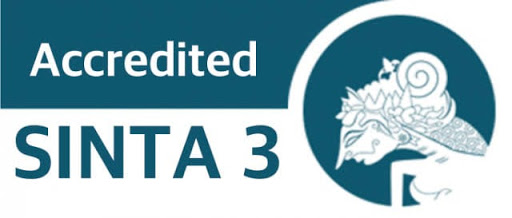Literacy Skills of Students in a Remote Area
DOI:
https://doi.org/10.30742/tb.v8i1.3506Abstract
Purpose Research. The research objective was to identify the literacy skills of Merangin 53 Remote Junior High School students. Research Method. This study used a qualitative method with an ethnographic approach. The data were collected through interviews, observation, and documentation. Analysis Data. The Spradley model was used in the analysis. The analysis steps consisted of determining participants, interviewing, making an ethnographic record, asking descriptive questions, analyzing the interviews, making a domain analysis, asking structural questions, making a taxonomic analysis, asking contrast questions, discovering cultural themes, and writing an ethnography Results. Literacy topics of Merangin 53 Junior High School students encompassed access to information, lack of literacy skills, literacy learning methods that rely on the teacher, guidance and mentoring, and literacy for effective school activity. Conclusions. Some topics collected from literacy skills included the influence of culture and the situation in the remote school. Some influences on literacy skills encompassed difficult access to roads, internet connections, transportation, and students' socioeconomic conditions.
Keywords: Information literacy, remote school, Merangin
References
Addae, D. (2021). Adults who learn: Evaluating the social impact of an adult literacy project in rural South Africa. Social Sciences & Humanities Open 3 (2021) 100115. https://doi.org/10.1016/j.ssaho.2021.100115
Boer, P.J., Asino, T.I. (2022). Learning Design Experiences of the Namibian Teachers during the COVID-19 Pandemic: an Ethnographic Perspective. TechTrends (2022) 66:29–38, https://doi.org/10.1007/s11528 021-00684-8
Creswell, J.W. (2014). Penelitian Kualitatif & Desain Riset. Yogyakarta: Pustaka Pelajar
Folotiya, dkk. (2014). The effect of using a mobile literacy game to improve literacy levels of grade one students in Zambian schools. Education Tech Research Dev (2014) 62:417–436, DOI 10.1007/s11423 014-9342-9
Iranda, A., Pramudiani, D., Rahman, M, A. (2023). Kemampuan Literasi Digital Siswa Berprestasi. Jurnal Psikologi Jambi; Volume 8 No. 02; 55 – 66; ISSN: 2580 – 7021, DOI: https://doi.org/10.22437/jpj.v8i02.29906
Jorosi, B.N., Isaac, G.G. (2008). Teaching Information Literacy Skills in Community Junior Secondary Schools in Gaborone, Botswana. Information Development (ISSN 0266-6669) . Vol. 24, No. 2, DOI: 10.1177/0266666908091126
Madu, F.J., Mariana, J., Marlinda, M. (2022). Implementasi Tahap Pembiasaan dan Pengembangan Literasi Membaca pada Siswa Kelas IV SDI Kusu Manggarai, NTT. Reswara: Jurnal Pengabdian Kepada Masyarakat; Volume 3 No. 2 Edisi Juli 2022; 258-571, ISSN: 2716 - 3997, DOI: https://doi.org/10.46576/rjpkm.v3i2.1962
Mahwasane, N.P. (2017). The Responsibilities of School Libraries in Sustaining Information Literacy. International Journal of Educational Sciences, 16:1-3, 90-97, DOI: 10.1080/09751122.2017.1311631
McKinney, P. (2014). Information literacy and inquiry based learning: Evaluation of a five-year programme of curriculum development. Journal of Librarianship and Information Science 2014, Vol. 46(2) 148–166. DOI: 10.1177/0961000613477677
Nursalim., Sudibyo, D. (2018). Pengembangan Egra Untuk Mengukur Kemampuan Baca Tulisa Siswa SD Kelas awal di daerah penggiran dan terpencil 30 Sekolah Dasar Kabupaten Sorong. Jurnal ABDIMASA Pengabdian Masyarakat; Volume 1 No. 1 Juli 2018; 6-14, ISSN: 2621-8100
Sukma, H, H., Sekarwidi, R, A. (2021). Strategi Kegiatan Literasi dalam Meningkatkan Minat Baca Peserta Didik di Sekolah Dasar. Jurnal Varidika; Volume 33 No. 1; 11-20, ISSN 2460 – 3953, DOI: 10.23917/varidika.v33i1.13200
Suragangga, I, M, N., (2017). Mendidik Lewat Literasi Untuk Pendidikan Berkualitas. Jurnal Penjaminan Mutu Lembaga Penjaminan Mutu Institut Hindu Dharma Negeri Denpasar; Volume 3 No. 2; ISSN: 2448 -3110, http://ejournal.ihdn.ac.id/index.php/JPM
Wulandari, dkk. (2021). Pemodelan Literasi Membaca Siswa di Daerah Terpencil Menggunakan Regresi Logistik Biner. Semantic Schoolar, DOI:10.37715/LEECOM.V3I1.1887Corpus ID: 236400602
Yanto, A., Imron, A., Benty, D.D.N. (2020). Manajemen pembelajaran sekolah dasar di daerah tertinggal. JAMP: Jurnal Adminitrasi dan Manajemen Pendidikan, Volume 3 Nomor 1 Maret 2020, Hal 72-83
Downloads
Published
How to Cite
Issue
Section
License
Once an article was published in the journal, the author(s) are:
- granted to the journal right licensed under Creative Commons License Attribution that allows others to share the work with an acknowledgment of the work's authorship.
- permitted to publish their work online in third parties as it can lead wider dissemination of the work.
- continue to be the copyright owner and allow the journal to publish the article with the CC BY-NC-SA license
- receiving a DOI (Digital Object Identifier) of the work.


.png)

